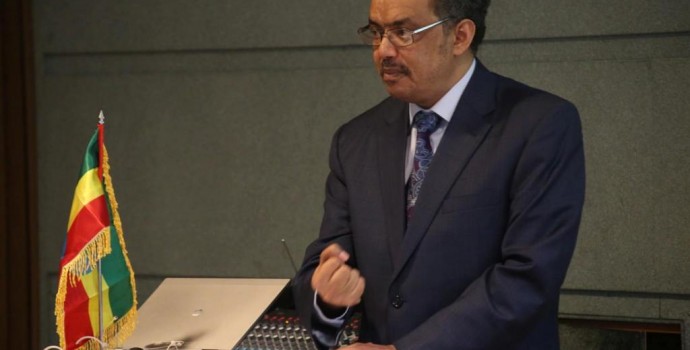Ethiopian FM Dr Tedros at Investment forum in Norway, in October 2014 (Image: Geeska Afrika)
Addis Ababa, 21 October 2014 (WIC) – Ethiopia has given top priority to the kernel of the entire diplomacy; economic diplomacy, as the nation has one formidable enemy; poverty or backwardness.
To effectively combat and eradicate poverty and backwardness, one has to pursue economic diplomacy which would enable it to attract more investment, trade, tourism among others, the Ministry of Foreign Affairs noted.
Economic policies adopted by the government in the last two decades have played an instrumental role in developing the country’s economy. Ethiopia has become one of the ten fastest growing countries in the world. Its past tarnished image of poverty, backwardness and war is being gradually reversed, the Ministry said.
In an exclusive interview with The Ethiopian Herald Ministry of Foreign Affairs Spokesperson Ambassador Dina Mufti said that the major economic diplomacy framework aims at attracting investment from foreign countries, promoting massive Foreign Direct Investment and ensuring proper technology transfer among others.
“We give emphasis to expanding the frontier of our relations to all corners of the world. In principle, as Ethiopia is part and parcel of the global community, it should have a vibrant tie with every country. If you ask me the distribution of Ethiopian councilors and embassies, I can assure you that they are scattered all over the world but basically we try to have embassies and consulates where things matter most,” the Ambassador said.
Ambassador Dina further said that nowadays the role economic diplomacy plays is immense. Recognizing this fact, economic diplomacy tops priority areas not only on Ethiopia’s diplomacy orbit but also on all nations’ diplomacy hubs. That is why Ethiopian diplomats are currently busy in speeding up the development of trade, the expansion of investment and the strengthening of relationships. They acquaint the country’s potential investment alternatives to the global business community, Ambassador Dina said.
Ethiopia’s trade link among different nations is gathering momentum. But this is not enough given the nation’s untapped and immense investment opportunities in the fields of agriculture, livestock, agro-processing, manufacturing, industry, construction and tourism.
Ambassador Dina said, on annual bases, Ethiopian ambassadors come together at experience sharing and idea cross-fertilization forums. On such occasions they discuss among themselves, congratulate over achievements, exchange recommendations over limitations and cheer out the yearly plan they envisage. They also get orientations on new phenomenon and new areas of focus. They as well conduct series of seminars. The objective is to strengthen their capacity especially where gaps are apparent. In such forums, he noted, ambassadors will be familiar with the new development within the country.
However, “Currently due to financial reasons and logistics we cannot have embassies all over the world but basically we have embassies in some major countries, specifically, countries that we call strategic partners.”
The nation does have diplomatic relations almost with all countries of the world, with over 180 countries. But here it must be noted that Ethiopia does have diplomatic relations where it even does not have embassies.
Approached by this journalist to have his say on the matter instructor of Political Science and International Relations at Addis Ababa University Demeke Achiso (PhD) on his part noted that, “Economic diplomacy tops the political agenda of every government in the 21th century. The same is true with the Ethiopian government. “Our representatives and top officials have committed themselves more to the economic issues.”
Economics and politics are the two sides of the same coin. As it is true of other nations, conducive political environment is basically needed to ensure sustainable economic development in Ethiopia, he said.
After ensuring democracy, peace and security as well as stabilizing regional security governments are now looking for economic diplomacy, because the key question for every society is the question of betterment, employment and income, Demeke said.
As to Demeke, the Ethiopian government is creating conducive environment to investors that come from abroad to invest in Ethiopia so as to improve national GDP and individual’s living standard in every aspect.
Yet now, we are not in a position to argue that the government’s economic diplomacy is 100 per cent successful. “Currently we are witnessing unprecedented success stories in Ethiopian history as compared to the era of the previous regimes,” he said. (EH)




